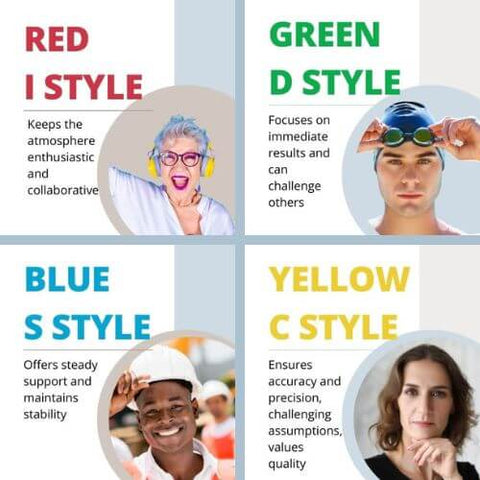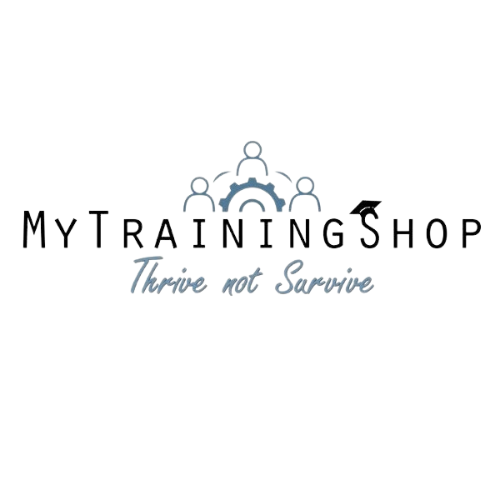
The Rise of the Skills-Based Business Model
Skills for Business Management
With ever-changing, rapid technological advancements, evolving job roles, and increasing demands for agility The modern workplace is experiencing a fundamental transformation in how organisations operate and develop talent.
What is a Skills-Based Organisation?

Traditional hierarchical structures are giving way to more dynamic, skills-based models that prioritise capabilities over titles. At My Training Shop, we’ve witnessed this evolution through our work with organisations across various sectors and how this transformation can impact businesses.
We’ve also seen first-hand how powerful understanding behavioural styles can be through the use of Everything DiSC® assessments and how it can significantly enhance this transition.
Key Takeaways
• Skills-based organisations prioritise capabilities over traditional hierarchies
• DiSC profiles enhance team composition and development
• Behavioural styles play a crucial role in organisational transformation
• Continuous learning becomes central to organisational success
Understanding Skills-Based Organisations

A skills-based organisation focuses on identifying, developing, and deploying capabilities where they’re most needed. This approach represents a significant shift from traditional models where job titles and hierarchical positions often limit potential and mobility. Instead, organisations are now recognising that success depends on having the right skills in the right place at the right time.
This transformation isn’t just about technical skills. Through our DiSC assessments and training programs, we’ve observed that behavioural competencies play an equally crucial role in organisational success. Understanding how different behavioural styles contribute to various roles and responsibilities helps organisations build more effective, balanced teams.
Why Are Skills-Based Organisations Gaining Momentum?

Research indicates that organisations taking a skills-based approach are outperforming traditional models in talent acquisition, employee retention, and workforce agility. According to a 2023 McKinsey report, skills-based organisations are 63% more likely to achieve higher productivity and 44% more likely to be innovative than those that rely on rigid job structures.

This shift isn’t just about technical expertise—it’s also about leveraging behavioural competencies to create well-rounded, high-performing teams. Our work at My Training Shop has shown that organisations that align both technical skills and behavioural styles see higher engagement, stronger collaboration, and improved change readiness.
How Can DiSC Support Organisational Change?

Different DiSC profiles bring unique strengths to a skills-based organisation.
Dominance (D) style individuals often excel in strategic planning and decision-making roles, driving change and innovation. Their direct approach and results-focused mindset can be particularly valuable in fast-paced, transformative environments.
Influence (i) style professionals strengthen organisations through their natural ability to build relationships and facilitate collaboration. In a skills-based model, these individuals often become crucial connectors, helping teams work together effectively and ensuring smooth communication across different groups.
Those with Steadiness (S) profiles contribute significantly through their consistent, supportive approach to work. Their ability to maintain stability while supporting change makes them invaluable in preserving organisational knowledge and ensuring smooth transitions during transformation.
Conscientiousness (C) style individuals enhance operations through their analytical approach and attention to detail. Their systematic thinking helps organisations develop robust processes and maintain high-quality standards throughout the transformation journey.
Implementing a Skills-Based Model
The transition to a skills-based organisation requires careful planning and execution. Organisations must first understand their current capability landscape, including both technical skills and behavioural competencies.

This is where DiSC assessments prove particularly valuable, offering insights into how different team members might respond to and contribute to the transformation. Take a look at our buyer’s guide to learn more, from either an individual perspective or from a business overview.
Communication plays a crucial role in successful implementation. Through our work at My Training Shop, we’ve found that understanding DiSC profiles helps organisations tailor their communication strategies effectively. For instance, when presenting change initiatives, messages can be crafted to resonate with different behavioural styles, increasing buy-in and engagement.
Building a Skills Taxonomy & Matrix
A key component of transitioning to a skills-based organisation is developing a skills taxonomy—a structured framework that categorises skills based on levels, competencies, and relevance to roles. This helps organisations map, assess, and deploy talent effectively.

A skills matrix, on the other hand, provides a visual representation of employees’ skills across different functions, making it easier to identify strengths, gaps, and development opportunities.
5 Steps to Implement a Skills Taxonomy & Matrix
Identify Core Skills: Define technical, behavioural, and leadership skills essential to your organisation.
Categorise Skills by Levels: Group skills into foundational, intermediate, and advanced competencies.
Map Skills to Roles & Projects: Align skills with organisational needs rather than job titles.
Assess and Track Development: Use DiSC and other assessments to regularly check in and refine skill alignment.
Embed into Workforce Planning: Integrate the matrix into talent development, recruitment, and succession planning.

5 Tips on How to Successfully Implement a Skills-Based Model
Making the transition to a skills-based approach requires more than just a mindset shift—it demands a strategic, step-by-step process:
1. Assess Current Capabilities – Conduct an in-depth skills and behavioural audit using DiSC assessments to understand existing strengths and gaps.
2. Redefine Roles Based on Skills – Move beyond rigid job titles and design project-based or skill-focused roles that leverage team members’ capabilities.
3. Tailor Communication Strategies – Use DiSC insights to customise messages and change management approaches that resonate with different personality styles.
4. Embed Continuous Learning – Develop flexible training programs that support upskilling and adaptability.
5. Measure and Adjust – Track performance through engagement metrics, skill development progress, and business outcomes, refining the approach as needed.
You may find this article: Employee Skills for Tomorrows Job Market of Interest
Cultural Transformation and Team Development
Creating a skills-based culture requires more than just structural changes. It demands a shift in how organisations view and value different capabilities. Through our training programs, we help organisations or supply trainers with reports to help recognise and leverage diverse behavioural styles, creating environments where all profiles can contribute effectively.

Team composition becomes particularly important in this model. Rather than focusing solely on technical skills, organisations need to consider behavioural dynamics when forming project teams. Our DiSC-based approach helps create balanced teams that leverage different strengths while maintaining productive working relationships.
Workplace transformation

In a skills-based organisation, professional development takes on new importance. Traditional career paths give way to more flexible development opportunities based on both technical capabilities and behavioural competencies. Through our comprehensive training programs, we help organisations:
The Impact on Professional Development
• Create personalised development paths that consider both technical skills and behavioural styles.
• Foster environments where continuous learning becomes part of the organisational culture.
• Develop leadership capabilities that support the skills-based model.
• Build resilient teams capable of adapting to changing business needs.
Why Partner with My Training Shop?
With decades of experience in organisational development, we understand the complexities of business transformation. Our certified DiSC practitioners can provide insights that go beyond standard training approaches. At My Training Shop, we provide comprehensive support for organisations making this transition.

Our services combine DiSC assessments, targeted training programs, and ongoing guidance to help organisations build and maintain effective skills-based models.
The future belongs to organisations that can effectively identify, develop, and deploy capabilities while understanding and leveraging different behavioural styles.
Touch down with us at My Training Shop today to learn how we can support your organisation’s transformation into a skills-based model that drives success and growth. Or to provide your business with DiSC reports and materials to support your in-house development.
Trainers, consultants, HR and Coaches
FAQ
Q: How does DiSC assessment integrate with a skills-based organisation?
A: DiSC provides crucial insights into behavioural competencies, helping organisations create balanced teams and develop targeted training programs that consider both technical skills and working styles.
Q: Can skills-based models work for traditional industries?
A: Yes. We’ve successfully implemented skills-based approaches across various sectors, adapting the model to each organisation’s unique needs and culture.
Q: What’s the first step in transitioning to a skills-based model?
A: We begin with a comprehensive assessment of your current organisational structure and team dynamics, including DiSC profiles, to create a tailored transformation strategy.
Q: How do you measure the success of the transition?
A: We encourage organisations to track multiple metrics including team performance, employee engagement, skill development progress, and business outcomes, provide regular reports then adjust strategies as needed.
© Sian










